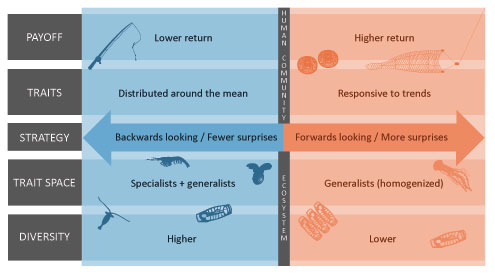An in-depth article by Pershing et al. (2019) shows that an increasing frequency of extreme ocean heat events, which they call “surprises”, is challenging autonomous modes of adaptation that rely on historical experience. They define a temperature surprise as an annual mean temperature that is 2 standard deviations above the long-term rolling mean and “Surprising surprises” are those events that are in excess of the number expected, based on the probability of a surprise determined from the rolling mean approach. A main finding by Pershing et al. (2019) is that the frequency of such surprises is increasing faster than expected and will likely continue to rise.
They contrast reactive adaptation that is guided by experiences of past events with proactive adaptation based on forward-looking decision-making. Based on mathematical models, they consider how ocean temperature trends and the frequency of surprise (high) events could affect natural and human communities under different adaptation strategies.
In an accompanying commentary, Ottersen & Melbourne-Thomas (2019) sum up implications for ocean ecosystems and human communities of these two main adaptation strategies as shown in Figure 1.
Pershing et al. (2019) study 65 Large Marine Ecosystems (LME’s) including the Arctic, where the increase in number of surprises is particularly high. We expect this to be the case also for the Antarctic; one of the globally fastest-warming regions, but this region was excluded because of lack of data. Thus, the cumulative increase in surprises may be even higher than estimated by Pershing et al. (2019).
A series of questions arise from this work. This includes:
1) how to account for surprises from other kinds of climate-driven changes in the marine environment (e.g., storm events, hypoxia, and acidification) and their cumulative effects,
2) how to account for surprises that occur at shorter (sub annual) timescales, and
3) how adaptation to temperature change via shifts in habitat range might interact with the strategies described to influence system-level outcomes (Ottersen and Melbourne-Thomas, 2019).
References
Ottersen, G., Melbourne-Thomas, J. (2019). Time to look forward to adapt to ocean warming. Proceedings of the National Academy of Sciences of The United States of America. DOI: 10.1073/pnas.1912639116
Pershing, A.J., Record, N., Franklin, B., Kennedy, B., McClenachan, L., Mills, K., Scott, J., Thomas, A., Wolff, N. (2019). Challenges to natural and human communities from surprising ocean temperatures. Proceedings of The National Academy of Sciences of The United States of America. DOI: 10.1073/pnas.1901084116
More reading
see post 1 and post 2 about marine heat waves.

Log in to comment
Not UiO or Feide account?
Create a WebID account to comment